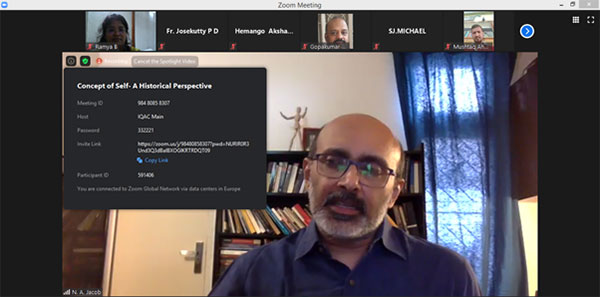
Department Webinar/Seminar
Seminar on “Ethnohistory and Ethnoarchaeology”
The Department of History, has organised a seminar on “Ethnohistory and Ethnoarchaeology” for two days from 10 A.M. to 11:40 A.m. from Sep. 22nd to 23rd Sep. 2021. The resource person for the event was Prof. C.A Mawlong, Professor & Head; Department of History, North Eastern Hilll University (NEHU), Shillong. Participants from invited colleges, the collaborative institutions, Sophia Girls College, Ajmer, St. Anthony College, Shillong affiliated to NEHU and Vellalar College for women, Erode and students of History, Kristu Jayanti College were greatly benefited.
The event started with the introduction of guest, by Prof. Ramya B, Head, Dept. of History, followed by the inaugural address by Rev. Fr. Dr. Augustine George. The two sessions in the seminar focused on the genesis, methods and significance of Ethnohistory and Ethnoarchaeology. The resource person elaborated on the importance of new approaches in the learning of history and understanding of society and culture. The resource person also stressed on the interdisciplinary social sciences research.
On the 2nd day, Ms. Kumari Krishna, a final year History student from Kristu Jayanti College, presented a brief summary of the lecture and Dr. Ravi Sankar K, Asst. Professor, Dept. of History provided concluding remarks.
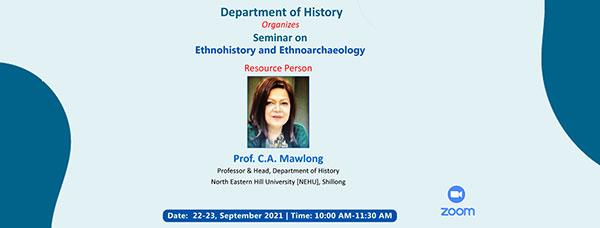
China and the Post COVID World Order
Date: 06/10/20
Platform: Zoom
The Department of History, Kristu Jayanti College in association with The International Peace Research Initiative (IPRI) at NIAS, Bengaluru, Konrad-Adenauer-Stiftung India, Department of International Studies, Stella Maris College, Chennai; Department of International Relations, University of Mysore and the Centre of Maritime Studies, Pondicherry University organized a webinar titled China and the Post COVID World Order on 6th October 2020. The resource person for the session was Mr. Vijay Gokhale, Former Foreign Secretary, Ministry of External Affairs, Government of India.
The session began with the welcome address presented by Prof. Ramya. B, Head, Department of History, Kristu Jayanti College; Prof. D Suba Chandran, Dean, School of Conflict and Security Studies, Prof. A. Subramanyam Raju, Coordinator Centre for Maritime Studies, Pondicherry University and Prof. Bharathi Hiremath, Head and Coordinator, Department of International Relations, Mysore University. After which the resource person Mr. Vijay Gokhale was introduced to the audience by Prof. D Suba Chandran. Then the platform was given to Mr. Vijay Gokhale to present his views on the topic. In his lecture the resource person elaborated on China’s policies and why there are a huge number of chances for China to be the next global power. He also explained how China aims at becoming a strong trader in the world and technology is its mighty weapon. Therefore, technology would play a huge role in future international scenario. He concluded by saying that the world is facing the end of multi polarity. Further the platform was open for the interactive session. And then the session came to an end by delivering a vote of thanks to the resource person by Prof. D. Subha Chandran.
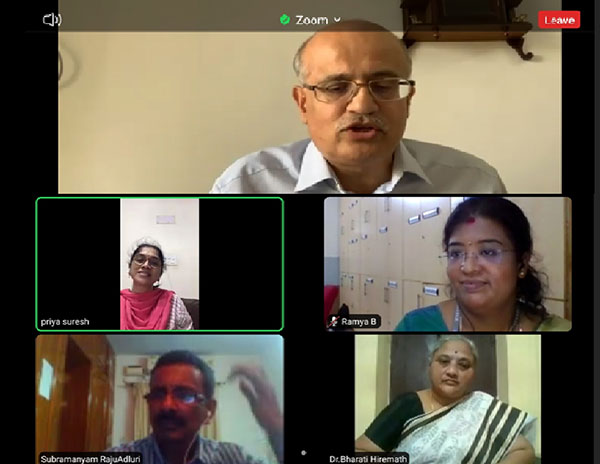
The Big Picture in the Middle East: Looking Beyond Israel, UAE, and Palestine
The International Peace Research Initiative (IPRI) at NIAS in collaboration with Konard- Adenaure- Stiftung India office has been organizing a Peace Lecture Series since 2018. This webinar organized on 25/08/20 was a part of the same series and was jointly organized by The Department of History, Kristu Jayanti College with National Institute of Advanced Studies, Bangalore, Department of International Studies, Stella Maris College, Chennai, the Department of International Relations, University of Mysore, and the Center of Maritime Studies of Pondicherry University. The resource person for the day was Ambassador Sanjay Singh, Former Joint Secretary and Additional Secretary (Gulf), Ministry of external Affairs, Government of India. Former Indian Ambassador to Iran, Former Secretary (East) in the Ministry of External Affairs.
The session began with the welcome addresses by Prof. Ramya. B, Head, Department of History, Kristu Jayanti College; Prof. D Suba Chandran, Dean, School of Conflict and Security Studies; Prof. Subramanyam Raju, Coordinator Department: Centre for Maritime Studies, Pondicherry University and Prof. Bharti Hemanth, Head and Coordinator, Department of International Relations, Mysore University. After which the resource person, Amb Sanjay Singh was introduced to the audience by Prof. D Chandran. Then the platform was given to Amb Sanjay Singh to educate the audience on the topic.
Sir in his lecture covered many different aspects in order to give a clear detail picture of Middle East. He spoke about key features of the changing regional order, in which he spoke about KSA COVID, energy prices and growing economic difficulties. Further sir spoke about the changing policies of Saudi Arabia and about the increasing Saudi- Iran conflicts, softening policy towards Israel and emergence of new Saudi –UAE security axis. Mr. Sanjay Singh also highlighted on the topics such as Qatar crisis within GCC and disunity in the peninsula. He also spoke on topics like, Trump administration policy towards the region, US unique capability of projecting force, US sanctions on Iran and unqualified support for Israel, Russia’s re-emergence as an assertive actor, Increasing engagement of Asian countries and China’s increasing presence.
At the end sir gave viable options to promote peace and stability, and spoke about the requirement of ‘leap of faith’ in the region in order to attain peace and the major powers must try to prevent region- wide conflagration and must promote dialogue. After which the platform was open for the interactive session. And then the session came to an end by delivering vote of thanks to Amb Sanjay Singh by Prof. D. Suba Chandran.
There were 41 participants for the event. Students were extremely pleased to get a bird’s eye view on the Middle East that focused largely beyond Israel, UAE, Palestine. Students could understand the need of peace and possible solutions in order to attain it. Students are looking forward for more such interesting and informative sessions.
J & K Today: One year after the removal of Article 370
The International Peace Research Initiative (IPRI) at NIAS in collaboration with Konard- Adenaure- Stiftung India office has been organizing a Peace Lecture Series since 2018. This webinar organized on 4/08/20 was a part of the same series and was jointly organized by The Department of History, Kristu Jayanti College with National Institute of Advanced Studies, Bangalore, Department of International Studies, Stella Maris College, Chennai, the Department of International Relations, University of Mysore, and the Center of Maritime Studies of Pondicherry University, Department of International Studies and History ,Christ (Deemed to be University) Bangalore , Department of Political Science ,St Joseph’s College,Bangalore, and Center for Statelessness and Refugee Studies, TISS Mumbai. The resource person for the session was Prof. Amitabh Matto, Professor of Disarmament Studies at the Center for International Politics, Organization and Disarmament, Jawaharlal Nehru University, Delhi Honorary Professor in the Faculty of Art, University of Melbourne. Chair, Jammu and Kashmir Knowledge Initiative. Former Advisor to Chief Minister (with status of Cabinet Minister) and Former Vice- Chancellor, University of Jammu.
The session began with the welcome addresses by Prof. Ramya. B, Head, Department of History, Kristu Jayanti College; Prof. D Suba Chandran, Dean, School of Conflict and Security Studies, Dr. Madhumati Deshpande, Head Department of International Studies, Christ Deemed to be University; Dr.P. E. Somaiah, Head Department of Political Science, St Joseph’s College; Dr. Priyanca Mathur, Center for Public Policy and Governance, Jain University; Prof. Subramanyam Raju, Coordinator Centre for Maritime Studies, Pondicherry University and Prof. Bharti Hemanth, Head and Coordinator, Department of International Relations, Mysore University. After which the resource person Prof. Amitabh Matto was introduced to the audience by Prof. D Chandran. Then the platform was given to Prof. Amitabh Matto to present his lecture.
Sir spoke on various areas like ‘Foiling Operation Gibraltar,’ wherein two Kashmiri Gujjaras helped to thwart one of the Pakistan’s most devious conspiracies in the Valley, and made the Operation Gibaltar to fail, because Kashmiris believe in the goodness and greatness of India. He also spoke about the mostly unsung Din and Mohammed who stood for and reinforced the idea of India in Kashmir. Further sir spoke about Baramullaha’s Maqbool Sherwani. It was a Sherwani in 1947 that helped delay the Pakistan – backed tribal invaders march to Srinagar from Baramulla before arrival of Indian armed forces. Then sir spoke about Ms. Mehmooda Ali who was a Principal of Government College for Women, Srinagar. She although being a simple lady did not tolerate one of her student shouting on ground “Pakistan Zindabad!” and thus confronted her. Sir called her as Principal of Principles. Further Sir also spoke about the power of the Soviet bond and The Bangladesh war.
Finally Sir concluded by saying that Article 370 had lost much of its potency even before the decision was made last year. The real challenge has remained in the emotional integration of Kashmir within the national mainstream. For that Jammu and Kashmir should move beyond the control exercise by its Kafkaesque bureaucracy, and must discover its new generation of leaders. After which the platform was open for the interactive session. And then the session came to an end by delivering vote of thanks to Prof Mattoo by Prof. D. Suba Chandran.
There were 45 participants for the event. Students were extremely pleased to understand the perspective of Kashmiris from a much respected resourceful person. Students could understand their problems and think about the real solutions. Students are looking forward for more such interesting and informative sessions.
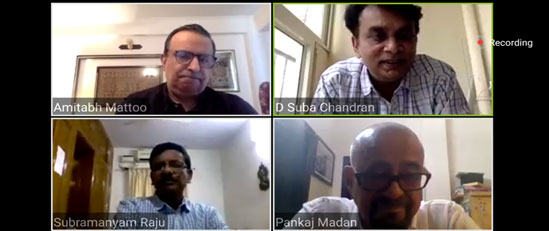
India from the Neighborhood’s Lens: Views from Nepal
The History Department, Kristu Jayanti College, in collaboration with National Institute of Advanced Studies, Bangalore, Department of International Studies, Stella Maris College, Chennai, the Department of International Relations, University of Mysore, and the Center of Maritime Studies of Pondicherry University, organized the webinar on the topic “India from the Neighborhood’s Lens: Views from Nepal” on 21st July, 2020. The resource person for the session was Dr. Nischal Nath Pandey, Director, Center for South Asian Studies (CSAS), Kathmandu, Former Executive Director, Institute of Foreign Affairs (IFA) under the Ministry of Foreign Affairs, Government of Nepal.
The session began at 11:30 with the welcome addresses were presented by Prof. Ramya. B, Head, Department of History, Kristu Jayanti College, Prof. Subramanyam Raju, Prof. Bharti Hemanth and Prof. D Suba Chandran. Further the resource person Dr. Nischal Nath Pandey was introduced to the audience by Prof. D Chandran. Post the introduction the session was taken over by Dr. Nischal Nath to present his lecture. Sir delivered the lecture for 30 minutes and in those 30 minutes he very clearly presented his views in a nutshell to the audience and spoke about the Indo- Nepal relations, problems and the possible solutions to overcome them.
Sir highlighted on various Indo- Nepal connections such as the open border connectivity, military connections (Gorkhas) and most importantly our historical and cultural connections. He emphasized on them and said that maintaining these ties are very important. He also appreciated India for always responding immediately to any natural calamities happening in South Asia. The speaker elaborated on how Nepal and other South Asian Nations idolize India for being a successful democratic country. However, smaller nations always want to show themselves to be perfectly sovereign, thus, despite all these positive connections problems and a feeling of Anti-India arise among various neighboring countries.
He also emphasized how other large nations like China take advantage of this and try to build up a better relationship with them. Thus, today there are more Chinese cities that are directly connected to Kathmandu than compared to that of Indian cities. And the present Nepali generations and students, unlike their forefathers travel much to other countries than that of India for education and employment purposes. Hence, India should observe all these and must take positive steps to build proper railway system between both the countries. India should also take in charge in activating the organizations such as SAARC, BIMSTEC etc., which are currently in a deep coma. These regional organizations are vital as they will serve in developing ties between regional countries and also the tax payers’ money is hugely being invested in them, thus they must be given considerable importance. The speaker also laid stress on the point that India should develop its bordering regions in various ways such as infrastructure, connectivity (roads and railways), and other facilities (education, hospital, employment) because by doing so the neighboring countries will be benefited and their relationship would improve better. He ended the session by saying that small hindrances are like hiccups which should not be considered as a huge issue, because countries that are very close and share commonalities (mainly culturally) are expected to develop such small conflicts.
Then the platform was open for the interactive session. After the question and answer session, the program came to an end. And it was concluded by delivering vote of thanks to Dr Pandey by, Prof Ramya. B, Prof. Bharthi Hemant, Prof. Subramanya Raju, and Prof. D. Suba Chandran.
There were 45 participants for the event. Students were extremely pleased to have got the opportunity to understand the views of our neighboring county Nepal towards India. Students were delighted to understand how beautifully and ethnically both the countries are connected and how hard it was to break the bonds between the two countries. Students are looking forward for more such interesting, informative and fruitful sessions.
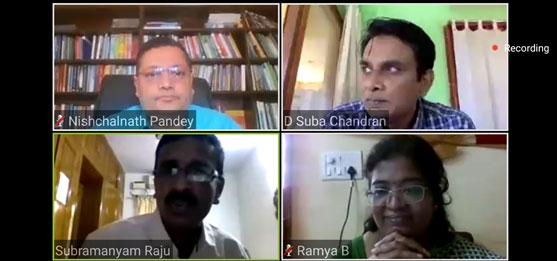
Hard Power in the Post COVID World Order
The Department of History organized a Collaborative Series Of Lectures with the Global Politics Course at the National Institute of Advanced Studies, in collaboration with Stella Maris College (Department of International Studies) Chennai, University of Mysore (Department of International Relations), Pondicherry University (Centre for Maritime Studies), and Kristu Jayanti College (Department of History) Bangalore. The session began at 11:25 on 07/07/20 with the welcome address presented by Prof. Ramya. B, Head, Department of History, Kristu Jayanti College. The speaker, Lt Gen (Dr) Prakash Menon has served the Indian army for 40 years. He has extensive operational experience in commanding counter- insurgency operations in Central, North, South Kashmir and the Siachen Glacier.
He was the major General Staff of the army’s Northern Command responsible for operations in J & K and the Commandant of the National Defense College, New Delhi. He is also the holder of Param Vishisht Seva Medal (PVSM), Ati Vishishta Seva Medal (AVSM) and Vishist Seva Medal (VSM).
After his retirement in 2011, he continued in government as the Military Advisor and Secretary to Government of India and from 2015 to 2017, as Officer of Special Duty in the National Security Council Secretariat (NSCS). He is the author of The Strategy Trap: India and Pakistan Under the Nuclear Shadow.
The speaker, Lt Gen (Dr) Prakash Menon began the lecture, by saying that the World Belongs to Young People. Dr .Menon stated that whatever one predicts the world order to be in future they are all based on assumptions. Yet one can still try predicting the future by acknowledging the present-day facts and on these criteria he said that COVID 19 has currently changed the world order and by the end of COVID pandemic, the world would change further and the power of various nations might change too. Further, sir, laid stress on Indian Geography and how specifically India’s maritime has helped India become a strong global figure, which among many things scares China. China’s chief worry lies in its trade routes, because it has created lots of trade lines on Indian borders and they are liable to be disrupted. Hence, China uses various strategies to gain economic and political control over India. Therefore, China tries to occupy places that are unoccupied; to an extent that it has also created artificial islands which they hope will serve in future warfare. With all such various examples Sir explained how Geopolitics works.
He also focused that becoming a super power also means influencing psychological phenomena. He argued that strategies are extremely vital as they connect means and ends, such as political, economic, psychological, diplomatic, military etc., to achieve the desired ends. Sir also explained how values, culture, technology etc., of a country influences its strategy and the kinds of wars that it wages (land wars, maritime wars, air wars, space wars, cyber wars, regular wars, irregular wars etc.,). About regular and irregular wars, he said that, Regular wars are the normal wars and irregular wars include terrorism, suicide bombing etc.,). Sir concluded by saying that India should be very alert to respond to all these wars and must take wise steps before reacting and also it is genuine for a government to not to disclose all its information, yet the Government of India should try to disclose its basic and not very private information to its citizens so that it can gain support from its citizens.
Post the presentation the platform was open for the interactive session. After the question and answer session, the program came to an end. And it was concluded by delivering vote of thanks to resource person, Dr Menon by, Prof Ramya. B.
There were 61 participants for the event. Students were extremely content to have got the opportunity to understand the use of hard power and how it can be utilized in good ways. Feedback from the participants was very positive and that they would be looking forward for similar value oriented academic events.
Webinar on Indian Strategic Relations in Post COVID World Order
Date: 19/06/2020 – 20/06/2020 | Time: 2 – 4 pm
Number of registrations: 653 | Number of beneficiaries: 220
Name and Details of Resource Person:
1. Prof D. Suba Chandran
Professor and Dean in School of Conflict and Security studies
Head of Conflict Resolution and Peace research program and Science Diplomacy Program
National Institute of Advanced Studies (NIAS)
Indian Institute of Science Campus Bangalore
2.Mr. Angshuman Choudhury
Senior Researcher, South east Asian Research Program
Institute of Peace and Conflict Studies, New Delhi
Former GIBSA Visiting Fellow in German Institute for International and Security Affairs, Berlin.
Founding Editor of Eleventh Column
Objective:
1. To ensure that students are academically productive during the pandemic.
2. To make students aware of the potential in understanding and learning International Relations.
3. To bring together academic personalities all over the world to help enhance the level of learning.
The Department of History organized a two day webinar on “Indian Strategic Relations in Post COVID World Order”. On day one, that is 19th June 2020 the session began at 2 pm. It saw the presence of Rev Fr Josekutty P.D, Principal, Kristu Jayanti College, Dr. Gopakumar A.V, Dean, Faculty of Humanities and Prof. S.J Micheal, Coordinator, Department of Social Sciences and Languages. The session began with the welcome address presented by Prof Ramya B, Head, Department of History. The resource person of the day was Prof D. Suba Chandran who is a Professor and Dean in School of Conflict and Security studies. Head of Conflict Resolution and Peace research program and Science Diplomacy Program in National Institute of Advanced Studies (NIAS) Indian Institute of Science Campus Bangalore. The session was divided into two phases. In the first phase, the resource person primarily spoke about the changing world order. He stated that in the past, the world order was mainly altered by ‘disruption’ due to various wars and conflicts but in the present the world order has been influenced due to ‘design’. The resource person gave perfect examples for his thesis providing statistics on how China rose to power and how the various Asian countries took advantage of the maritime trade and became a global world power and as a result saw the balance of power shift in Asia's favour. On covid-19 and India's global objectives, the resource person gave a very realistic approach on how India’s options are limited and the impending threat of the neighbouring countries turning hostile. In conclusion he stated that for India to emerge as a global superpower in the post covid world order, India must focus on fixing its nations image as a secular, democratic nation. In the second phase, students and faculty members were given the opportunity to interact with the resource person through a Q & A session moderated by Prof. Ramya, Head of the Department of History, who also concluded the session by offering the Vote of Thanks.
On day two (20\6\20202), the resource person is Mr. Angshuman Choudhury who was a Senior Researcher, South east Asian Research Program in Institute of Peace and Conflict Studies, New Delhi and is also a Former GIBSA Visiting Fellow in German Institute for International and Security Affairs, Berlin. Sir was also a Founding Editor of Eleventh Column. During this session there was the presence of Rev. Dr Augustine, Vice Principal of Kristu Jayanti College. This session too was divided into two phases. In the first phase, the resource person talked about how the world order had already changed before the pandemic struck the world and emphasised more on the question of ‘what India must do?’. He gave brilliant solutions to this question like improving India’s medical diplomacy, fixing the border problem, improving its soft power, ramping up Indo-pacific relations and lastly engaging in more multilateral conferences with India’s neighbours and to prioritise the various multilateral organisations like BIMSTEC, SAARC, ASEAN, which could in turn impact India’s request for a permanent seat in the security council. Lastly, he spoke about the present China border dispute and gave very realistic perspective on the issue by starting that India must first recover socially and economically rather than going for war. He also suggested that rather than boycotting Chinese products a better alternative would be to impose restrictions on Chinese FDI. The second phase of the session gave an opportunity for students and faculty members to interact with the resource person through a Q & A platform moderated by Prof. Ramya. The session concluded with the vote of thanks delivered by Prof. Hemango.
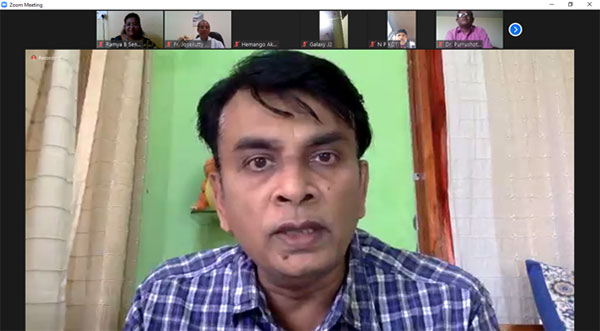
Webinar on Concept of ‘Self’ – A Historical Perspective
Date: 12/06/2020
No of Registrations: 245 | Number of beneficiaries: 119
Name and Details of Resource Person: Dr. N.A Jacob Assistant Professor, Department of English Ramjas College, University of Delhi
Objective:
1. To ensure that students are academically productive during the pandemic.
2. To enlighten students on the concept of the self and understand it better through the field of history.
3. To bring together academic personalities all over the world to help enhance the level of learning.
The department of History organised its first webinar on the concept of Self and Rev Fr. Josekutty P.D, Principal, Kristu Jayanti College provided his introductory remarks on the quest that existed from times immemorial to understand the idea of ‘self’. Prof N.A Jacob presented an ideological account, of certain texts that covers the concept of self in the wide historical period and generate interested among the listeners about the idea of self- examination.
The session started with the philosophical idea of Descartes, His texts Discourse of Method and Meditations On First Philosophy. Descartes wanted to find a one firm immovable point to build a centre of knowledge. He lead his followers to cast into a series of doubt on SENSES which is subjective and unreliable truth. According to him the only real truth is him because “ I am a thinking being”, “what I think may not be right, but it is a fact that can be proved or disproved” That itself is a proof that I EXIST. Prof Jacob provided an interesting narrative on
• Intellectual mind that is distinct from corporeal [worldly] nature
• Clear and indistinct knowledge [ undebatable knowledge]
• Animals do not have the self -consciousness which is the important distinction between humans and others
The session then proceeded to explain Locke description of self, which was different from Descartes as he adopted empiric tradition. His ideas on
• There is nothing that the self-bring with it when it is born.
• self is conceived without any quality in the beginning, and only route it arrives at truth is through experience
• Experience – external source- processing the sensory data and then arrive at the truth. He categorised sensation as [ 1. data from external world, 2. faculty of reflection of the mind] It is one’s ability to internalise and ability to reflection characterises one from another.
were well explained. All that one knows it is the interplay of extrinsic and intrinsic ability . The ideas of Locke’s Personal identity come from Conscious thinking being, to move from one moment to another. A thinking thing that extends with time
Prof Jacob also proceeded to explain the ideas of Immanuel Kant’s Transcendental reality where knowledge is produced through ‘application of knowledge’ of what we already know. Self or person is a bundle or collection of different perceptions. Kant‘s third critique tells us about what we can know. Faculty of aesthetic judgement are things that are possible for human mind to infer about claims of beauty . The highlights were
• constructs knowledge out of sense impressions and from universal concepts called categories that it imposes upon them
• Knowledge is produced through application of knowledge of what we already know
• Self is a bundle or collection of different perceptions
He concluded his narration with the Psycho analytical notion of Self by Sigmund Freud.
